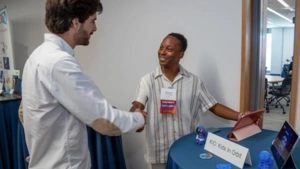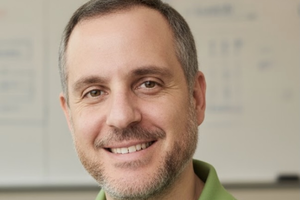When Bobbi Kurshan joined Penn GSE as executive director of academic innovation in 2012, one of her stipulations was that she be allowed to start a new master’s program in education entrepreneurship, a program that had previously never existed—at Penn or anywhere else. But Kurshan was used to trailblazing.
She earned degrees in math and computer science when women were underrepresented in those fields. She developed the first children’s software products for Microsoft. And over her long career as an entrepreneur, investor, developer, and academic, she had been at the forefront of the intersection of technology and education. If she was going to return to a university—a place used to a markedly slower pace of change than the tech world—it was going to be with a promise that boundaries would be pushed and things would be done differently.
“I wanted to find a way for the educators that were creating all these startups that I was investing in to have a rigorous academic introduction [to entrepreneurship],” said Kurshan.
With buy-in from then-dean Andy Porter, she began the journey to creating the Education Entrepreneurship program (now colloquially known as “EdEnt”), which celebrated its 10th anniversary this past summer. The goal was to leverage faculty from across the University—Wharton, the Weitzman School of Design, Penn Engineering, and Penn GSE—along with experts from industry, to offer a practical curriculum that integrated theory and practice across business, education, and entrepreneurship. Students would enter with either an existing venture or an idea for one, and over the course of 12 months, develop a business they could take to market.
In 2014, she hired Senior Fellow Jenny Zapf to help launch the new one-year master’s degree. Zapf was then the director of evaluation and strategy at Temple University’s College of Public Health and School of Social Work and had decades of experience starting education and social ventures in schools, nonprofits, research institutes, and venture labs. An entrepreneurial leader with a PhD in education evaluation, she also brought deep expertise managing, funding, evaluating, and scaling social impact ventures.
The initial challenge was sizeable, noted Zapf, who is now program director of EdEnt. “I joined eight weeks before our launch, and we had maybe two students who were interested and two faculty. So we built this new venture like a lean startup—applying business knowledge, entrepreneurial skills and mindset, an understanding of our customers and of the culture, marketplace, and landscape of education.”
They created buzz with their new model program, attracting an inaugural cohort of 21 students from across the US. Using their collective expertise in instructional design (Kurshan) and educational management and evaluation (Zapf), they built a curriculum from scratch and then spent that first year integrating rapid-fire feedback from students, faculty, and industry experts to improve and build upon it.
“We spent a tremendous amount of time talking with stakeholders,” said Zapf. “We solicited and heard real-time feedback from students, and we kept opening up the curriculum, testing little chunks at a time, continuously refining it. . . . Liza Herzog, C’92, GED’02, GR’04, and I built our entire first course—Evaluation for Education Innovation—with industry leaders in social impact, best practice research, and the first cohort of students. We needed a course that, at the time, did not exist, so we codesigned a pilot syllabus, tested it, redesigned, and learned what worked along with our learning community.”
EdEnt was created with and for working professionals and, therefore, is delivered through a blend of online and on-campus weekend and summer programs. A crucial element is the much-beloved capstone project, which finds students building a business case either for their existing venture or a new one and culminates in a pitch showcase in front of a panel of distinguished judges. Throughout the 12-month project, students pitch, test, iterate, pivot, and refine their venture ideas through meetings with a team of mentors.
Learning to pivot is an especially crucial skill. Many EdEnt students start the program with one venture idea, and graduate with a business that looks quite different. Aqeela Allahyari, GED’23, entered EdEnt hoping to start her own bilingual school for Arabic and English speakers, but after only a month in the program, she realized her interest was focused on curriculum creation and finding a better way to help children learn Arabic. So she switched gears, creating an edtech platform, ArabiQuest, that gamifies Arabic language learning, making it fun and engaging for children. It recently won first place at Startup Bahrain’s Pitch Series.
“One key lesson was the importance of ‘marrying the problem, not the solution,’ as my mentor Caroline Hill [founder of 228 Accelerator] would say,” said Allahyari. “This required a significant mindset shift and ultimately led to my biggest takeaway: the ability to identify and address the real problems that need solving.”
Mariam Murad, GED’22, was already the director of the Knowledge School, a chain of 200-plus comprehensive schools across Pakistan run by her family, when she applied to join EdEnt. As part of her capstone, she not only sought to make improvements to her current schools, but she also wanted to pilot a new one: the International School of Knowledge and Leadership (SKL), adapting Finland’s early childhood curriculum for her home country.
“EdEnt helped me refine [my idea] through a careful market research and analysis,” she said. “I had worked mainly on the basis of intuition until then. I started SKL as a pilot located in Lahore . . . as summer school, then [changed to make it] a playgroup to grade two, a pivot that I made after careful deliberation, working on the project, and connecting with my capstone advisor.”
In January 2024, SKL opened its doors to parents and students. EdEnt helped Murad take it from an idea to a reality in her community.
“The opportunity to build a venture alongside others in a structured format with access to experts around the world, scaffolded curriculum to guide you through each critical phase of venture development, an alumni community with leaders across education institutions, policy, the private sector, and venture capital, is unmatched,” said Kelly King, GED’19, vice president of partnerships at Prof Jim, whose capstone project was an international exchange program. “Building a venture is a lonely and vulnerable journey. Joining this program expedites each phase of venture development.”
EdEnt has grown over the last decade to serve a wide range of students, ventures, and experiences. It supports both entrepreneurs starting or growing their education venture and “intrepreneurs” who work within an existing school or company to enact new visionary strategies or change. Though early cohorts were more focused on preK–12 education and creating schools, later cohorts have been equally invested in problem-solving in the higher education and continuing education spaces. It has graduated 400 alumni who live in 45 countries—from Australia to Zimbabwe. More than half identify as people of color, and 60 percent identify as women. The most recent cohort is almost three times the size of the first one, with half hailing from outside the US.
EdEnt also welcomes applicants from a wide variety of professional backgrounds. Some students apply as experienced entrepreneurs who are looking for a better foundation in education and learning sciences, while others have great ideas but need to learn how to make them market-ready, impactful, scalable, and sustainable.
Alonso Alegre, GED’21, and his wife Maria Paz Revoredo, GED’22, launched their joint venture, Educa College Prep, which offers college counseling services for students in Hispanic America who are interested in attending university in the US, Canada, and Europe, while they were still in university, studying business in Peru. Nine years in, Alegre joined EdEnt to better understand the educational theory behind their venture. He learned so much—which, he said, helped double Educa’s sales—that he encouraged his wife to follow in his footsteps to Penn GSE the following year.
After pivoting from an in-person business serving students based in Lima, Peru, to a virtual business since graduating, they’ve expanded their customer base across Hispanic America and moved to Panama.
“We’ve had a lot of support from the program, from professors, from Jenny, and from two fellow classmates in our moving to Panama,” said Alegre. “I think that the community that you build within the program, you get a lot from it.”
“I think that something very cool from the program is that, of course, you learn in class, but you also learn outside of the classroom with your friends,” said Revoredo. “It was awesome that it was such an eclectic mix of different people from different backgrounds, of different ages. One of my best friends from the program is twice my age, and I learned so much from him.”
The success of EdEnt—and the curriculum that Zapf and Kurshan created without a blueprint—was evident almost immediately to its founders. Zapf said from the very first cohort, she could see the students applying what they learned in the program to their ventures in real time.
“What made me think there’s something really special going on here was that the students all came with an urgent problem to solve, and that made their education so real and actionable,” she said. “They would go to class, and they would grab onto the tools, and then they would go back into their home and work environments and apply them. . . . It was this really dynamic, fast, applied learning that I hadn’t seen before in a classroom, and that was super exciting.”
“The program not only teaches you how to navigate the education market of today but gives you the skills and knowledge to adapt for the future,” said King, who, before Prof Jim, worked at StartEd, advising edtech startups. “We reviewed multiple cases of major education companies and heard predictions from our professors. In nearly every single prediction, our professors were right. The program gave us the ability to see into the future of the market, and I’ll forever be grateful to the team and faculty.”
In many ways, EdEnt is yet another “startup” that Zapf and Kurshan were able to help get off the ground.
“I’m proud that the program’s continued and Jenny has carried it forward,” said Kurshan, who stepped down as executive director of academic innovation in 2020 but remains a senior innovation advisor to EdEnt. “And then the other thing I’m most proud of is the alumni. They have been amazing in what they’ve done. I’ve stayed friends and an advisor with many of them. They’re just amazing.”
Those alumni likewise have said that the experience of being in EdEnt has been life-changing. Two members of early cohorts, Igor Kouzine, GED’16, and Brad Beshara, GED’15, have stayed with the program since graduating, first in strategic advisory roles and later running their own courses in marketing and finance. For its alumni, EdEnt has been the catalyst to their business ventures, their classroom learning, their friendships, and the creation of an ongoing global community.
“I can’t say enough about how the program has impacted me,” said King. “My capstone advisor, Rita Ferrandino [of Arc Capital Development], connected me with what would become my future employer. I recruited mentors for my job through the alumni community, tapped into previous cohorts for career advice and warm introductions for career opportunities, and made some of the closest friendships of my life. When in need of support, advice, or connections, the EdEnt community will always be the first place I turn.”
Read more about the 10-year anniversary of EdEnt and several alumni ventures in the fall/winter 2024 issue of Penn GSE Magazine.
Media Inquiries
Penn GSE Communications is here to help reporters connect with the education experts they need.









